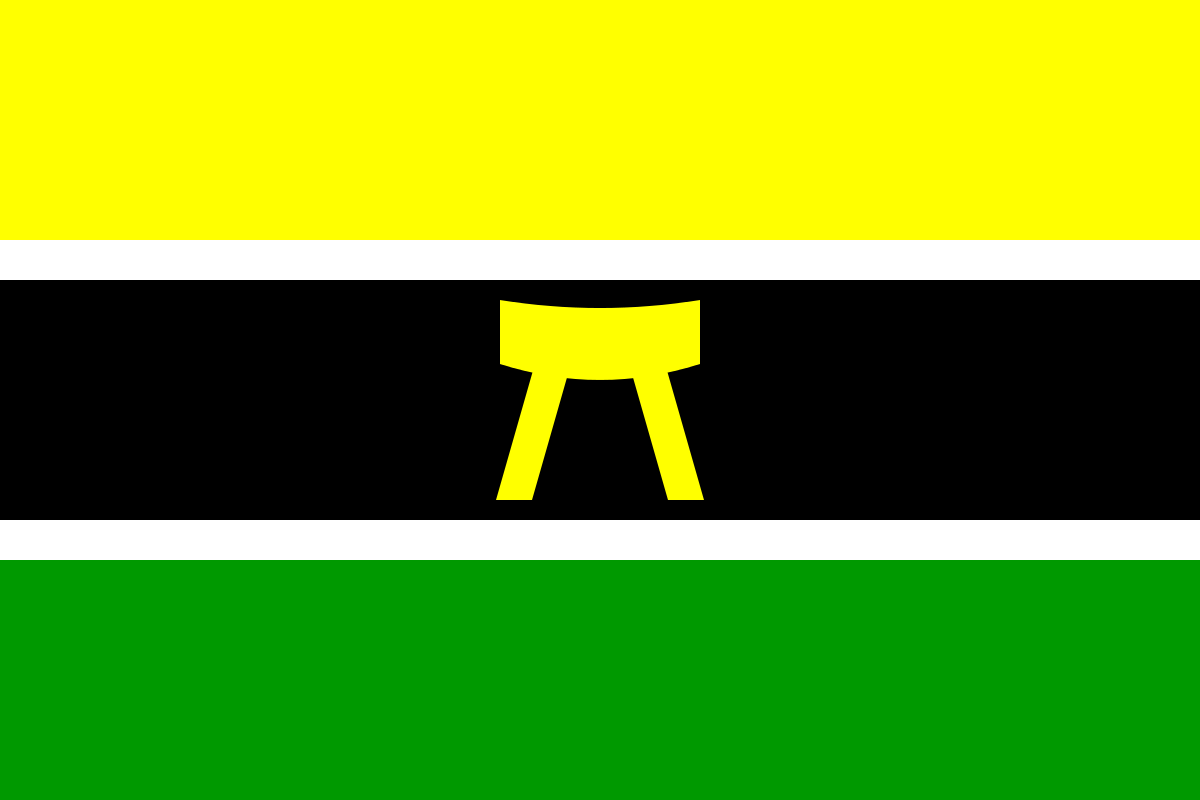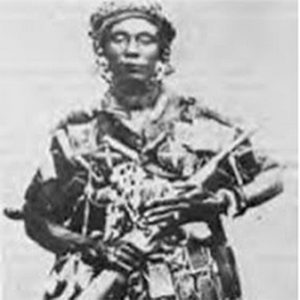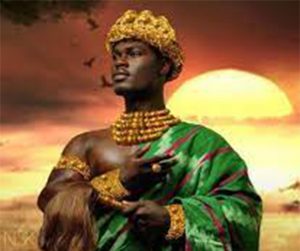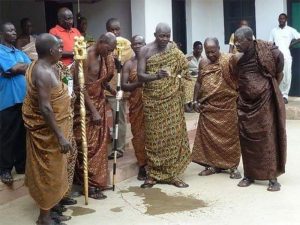| Date(s) | Item |
|---|---|
| 1551 – 1650 | Asanti (Ashanti) exported gold north. |
| 1697 | Osei Tutu, the Asantehene (king), created Asanti Union. |
| 1701 – 1750 | The kingdom of Asante, in the modern state of Ghana, became powerful. In order to expand the power of his kingdom, Osei Tutu, together with his chief priest, changed the constitution and the ceremonial regalia (cloths, ornaments, and decorations). Particularly, Osei Tutu substituted for the royal throne (a stool) a special Golden Stool, which (he said) had descended from heaven into his lap, symbolizing the Asante nation. Every year, the Asante people assembled after the yam harvest for a national festival, the Odwira, for their unity with their kingdom. |
| 1896 | As British colonial power expanded in West Africa, there were clashes with the Asante and the area became a British protectorate. The king Prempeh was removed. |
| 1901 | The area was annexed with the southern area of what is now Ghana as the colony of the Gold Coast. The British often used the Golden Stool in ways that distressed the Asante people. |
| 1935 | The Golden Stool was returned to the people of Asante. The Asante were re-united, at least in a symbolic way, as a new Asantehene (king), Prempeh II, revived the ceremonies. During the late 1930s, Prempeh II did much to restore the glories of the old ceremonies of the Asante. |
| 1947 | Kwame Nkrumah returned to the Gold Coast. |
| 1957 | Ghana became the first black African state given independence by Britain. Leaders Kwame Nkrumah was referred to as J.J (Junior Jesus) as Ghanaians believed that just like the Messiah, Nkrumah saved the country from colonial rule. Under Nkrumah’s regime, the Ashanti people suffered humiliation. |
| 1957 – 1963 | The Greater Togo Movement of Ewe separatists sought to separate Trans-Volta (now Volta Region) from Ghana and annex it to Togo. During this period, especially 1961, not one Ewe held a position in Nkrumah’s cabinet. |
| 1966 | Nkrumah was overthrown by General Emmanuel Kotoka (a Ewe) and went into exile. It was widely held that Kotoka had a lot of support from his own people. Power transferred from the coastal Akan peoples to the Ewe and Ashanti. The Ewe and Ga were over-represented in the cabinet. Northerners represented only 12 of the 1966 cabinet. (They account for about 25 percent of the country’s population) |
| Apr 1967 | General Kotoka was killed during an abortive coup attempt. Anti-Ewe sentiment rose throughout the country. The coup attempt was widely believed to be conducted by Ashantis and Fantis who try to revwrse the growing domination of the state by Ewes. |
| 1969 | Government intervention in the selection of Ya Na (paramount chief) of the Dagomba, a northern people, resulted in rioting against the government. |
| 1971 | Only one Ewe was serving in a senior army position by the end of 1971. |
| Jan 1972 | Ignatius Acheampong (an Ashanti) seized power in a coup. His National Redemption Council (NRC) was relatively diversified in ethnic composition. Yet under Acheampong’s rule (1972- 1978), the Ashanti appeared to play a key role in politics. Between 1973 and 1977, Ewe revived the sentiments of secession. |
| Jul 1978 | Acheampong was replaced at the head of the SMC by General Fred Akuffo. But Akuffo’s regime (SMCII) proved to be no more than a footnote to Acheampong’s period in power. |
| Jun 4, 1979 | Flt.-Lt. Jerry Rawlings (half Ewe) seized power in a coup. Ewes took many key positions in his regime. |
| Sep 1979 | Ewe supported their compatriot K.A. Gbedemah and his party, the National Alliance of Liberals (NAL), in the general elections. But the Progress Party (PP) came to power. |
| Sep 1979 | Hilla Limann (a northerner) became president through a general election. Ewes supported Limann’s Peoples National Party (PNP) in the election. Limann’s PNP had its support base in the north and west. Many Akan peoples living in Ashanti and Brong-Ahafo areas voted for the PNP in the 1979 elections, but they did not get adequate recognition from the Limann government. By the end of 1981, the Limann regime had lost its influence over the groups making up the society and the economy declined sharply. |
| Dec 31, 1981 | Rawlings led his second coup and assumed the chairmanship of the Provisional National Defense Council (PNDC) after overthrowing the Limann’s civilian government and banning all political parties. As Rawlings came to power, Ewes’ ethnic consciousness has further consolidated to the extent that they attempted to maximize their political influence. Rawlings cut back on the prominence of Ewes in his cabinet and yet Ashanti demands increased. |
| 1982 | Contention was greatly intensified among different ethnic groups. The armed forces were increasingly divided along ethnic lines, with the Ewe supporting Rawlings while the large number of northerners backed Sgt. Aloga Akata-pore. |
| Jun 19, 1983 | A coup was attempted but crushed by the government troops. The PNDC government accused Ivory Coast of allowing its territory to be used as a base by the Ghanaian dissidents. Throughout the 1980s since the PNDC assumed power, there were a number of attempts and plots to overthrow the government. |
| Jul 5, 1990 | The PNDC, under pressure from western donor nations and opposition groups to restore a multi-party civilian government, announced the commencement of a national discussion on the country’s political future aimed at the development of democracy. |
| Aug 1990 | The Movement for Freedom and Justice (MFJ), an umbrella organization, was launched to promote the return of multi-party politics to Ghana. |
| Sep 15, 1990 | The MFJ was denied permission by the police to hold its inaugural rally in Kumasi, Ghana’s second largest city. |
| Jul 2, 1991 | Political opponents of the ruling PNDC, who were in voluntary exile, were granted amnesty to return and assist in the national reconstruction. |
| Dec 1991 | According to a report of the International Human Rights Group Amnesty International, the PNDC misused power by using imprisonment as a means to suppress political opposition. The report stated that over 50 people were being detained without proper trial. Secretary of the Interior Nana Akouko Sarpong denied the existence of political prisoners and dismissed the human rights report as being part of a “propaganda war” against developing nations. |
| Dec 28, 1991 | The Consultative Assembly on the drafting of a new constitution asked that its deliberations be prolonged until March 1992. |
| Mar 1992 | On the 35th anniversary of independence, Rawlings announced a timetable for returning the country to civilian rule. |
| May 17, 1992 | In the wake of the adoption of a new constitution in April, the ban imposed on political parties in 1981 was lifted. The registration process was boycotted by many groups, who took legal action against the legislation. |
| Nov 2, 1992 | Rawlings won 58 percent of the vote in the presidential election. Ewes in the Volta region on Ghana’s eastern border overwhelmingly voted for Rawlings, their favorite son candidate, while the Akan vote was more evenly spread. All of the four opposition parties — New Patriotic Party (NPP), People’s National Convention (PNC), National Independence Party (NIP), and the People’s Heritage Party (PHP) — immediately disputed the results, alleging fraud and intimidation of voters. Yet, the head of a 15-member international observers, called the Commonwealth Observer Team, said that although the process had not been without incident, the elections were free and fair. |
| Nov 11, 1992 | The Ashanti regional administration lifted a curfew that was imposed last week on the Kumasi metropolitan area due to rioting over the results of the recent elections. |
| Dec 29, 1992 | The four main opposition parties boycotted the national parliamentary elections. They wanted to postpone the elections for two years and to establish an interim parliament with equal representation for all the parties. Among the four parties, the NPP had been quite certain of ousting President Rawlings. Still, the elections were held and Rawlings’ National Democratic Congress won 189 seats out of 200. |
| Jan 1993 | A shadow organization calling itself Farigan, led by Lagos, Nigeria-based Alhaji Damba, claimed responsibility for bombings in Accra (the capital) and Tema (an industrial city). |
| Jan 7, 1993 | The Fourth Republic of Ghana was proclaimed. Also the four main opposition parties issued a joint statement of the acceptance of the “present institutional arrangement.” The parties, assembled as the Inter-party Coordinating Committee (ICC), urged its members to “give the government a chance to prove that it is interested in the institution and restoration of democracy.” |
| Dec 20, 1993 | More than 1,500 delegates of the NPP (a major opposition party) met at the University of Ghana, Legon, for their second annual conference. A resolution called for a revision of electoral laws and procedures. In addition, the resolution demanded a commission of inquiry into the recent allegation of corruption and embezzlement of public funds. |
| Feb 16, 1995 | Bushfires swept across Ghana causing extensive damage to forests and crops. At least 12 were killed |
| May 3, 1995 | Anti-government demonstrations took place in Accra. They were sponsored by the Alliance for Change and they resulted in clashes between pro- and anti-Rawlings demonstrators. Five people were killed in the clashes. (The Alliance for Change may be a mostly Ashanti organization-they were planning a similar demonstration in the Ashanti region). |
| Jun 23, 1995 | Thousands demonstrate in the sea port of Takoradi in protest over the high cost of living. Ghana has implemented World Bank sponsored austerity measures since the early 1980s and is generally thought to be in healthy financial shape compared to other African states. Yet, per capita income is low (about $450/year) and unemployment is high. |
| Aug 14, 1995 | Ashanti king Otumfuo Nana Opuko Ware II celebrated his silver jubilee (75th birthday) on the 300th anniversary of his kingdom. Celebrations were attended by President Rawlings who is married to a member of the Ahsanti royal family. Much of the opposition to Rawlings’ regime, however, comes from the Ashanti community. |
| Feb 19, 1996 | A dispute between the traditional rulers of two central Ghanaian regions led to weekend riots in which at least six people were killed, scores were injured, and houses and other property were destroyed by fire. The riots occurred in the district of Techiman. They were sparked by an apparent move by the king of the Ashanti people to reassert his influence over the area, which had once been part of the Ashanti empire but later became autonomous. The issue of tribute collections, which had been dormant, resurfaced on Feb. 12 when Asantehene (king) Opoku Ware II announced the promotion of 17 subchiefs to the rank of paramount chief. The newly promoted chiefs included those from Tanoso, Tuobodom, Tano Boase and Buoyam in the Techiman area. The promotion should have been done by the paramount chief of the Techiman Traditional Area, Nana Takyi Ameyaw, who saw Ware’s move as meant to reassert his former authority. Following the promotion announcement, therefore, the four towns each had two chiefs, one installed by the traditional kingmakers of Techiman and the other by the Asantehene. However, after the weekend riots involving supporters of the rival chiefs, those installed by the Ashanti leader fled the area.(Source Inter Press Service, 2/19/96) |
| Dec 4, 1996 | Political activity in Kumasi, capital of Ashanti region, was banned by the Regional Security Council following pre-election violence. The ban on the political activities included rallies, blockade of roads and streets with songs, and other acts that are likely to lead to violence in the metropolis. The decision was the result of an incident which occurred at Old Tafo near Kumasi on December 3, which resulted in the lynching to death of one Emmanuel Yao Gruponi, popularly known as Ima Yao of the NDC [National Democratic Congress] youth wing. The NDC’s party office was burnt down, and a house was attacked.(Source BBC Summary of World Broadcasts, 12/4/96) |
| Dec 10, 1996 | Although the official total from December 7 presidential elections has not yet been announced, President Jerry Rawlings looks assured of a historic win in Ghana’s elections after dominating the West African nation’s political scene for almost two decades. No incumbent has been re-elected since Ghana won independence from Britain in 1957. The final count for parliamentary elections also held on December 7 has been announced. The count gives the president’s National Democratic Congress party 117 seats in the 200-seat assembly. The combined opposition has 62 seats.(Source Reuters World Service, 12/10/96) |
| Dec 23, 1996 | Kofi Annan of Ghana became the first sub-Saharan African to head the United Nations as Secretary General. (Source Inter Press Service, 12/23/96) |
| Jan 25, 1997 | The Ashanti Regional Police Command sent a reinforcement to Nsuta to help contain the tense situation which developed between the people of Nsuta and Bepawso. Citizens of Nsuta yesterday blocked the road between the town and Bepawso and prevented travelers going to and from Bepawso. The blockade was in protest against a letter allegedly written by the Bepawsohene [traditional ruler] to the Nsutahene claiming that the people of Nsuta are occupying Bepawso land. Fourteen people, including school children, were injured, and four people were killed.(Source BBC Summary of World Broadcasts, 1/25/97) |
| Sep 9, 1998 | The Ashanti regional security council has urged members of the Sunna and the Tijaniya Muslim sects to respect customs, traditions and norms of the Islamic religion. They should also tolerate each other’s views to avoid frequent outbreaks of violence between them. The council directed that the use of public address systems by the two sects should cease. Police have been monitoring the Zongo and the Aboabo communities to ensure that there is no breach of the peace. (Source BBC Summary of World Broadcasts, 9/9/98) |
| Oct 15, 1998 | The man reputed to be the Kabila of the ruling National Democratic Congress (NDC), Goozie Tanoh, is reported to have gone underground after what NDC reformers called persistent pressure on him to renounce his Movement. In recent weeks, signals have been sent to the NDC to reform or risk the imminent breakup of the party. (Source Africa News, 10/15/98) |
| Oct 25, 1998 | John Agyekum Kufuor, a lawyer and economist, was on Saturday re-elected presidential candidate of the New Patriotic Party (NPP) to contest the 2000 elections. (Source Africa News, 10/25/98) |
| Nov 3, 1998 | Another rebel group has emerged in the Ashanti Region and is accusing the Regional Minister, Mr. Daniel Ohene Agyekum, of being undemocratic. The rebel group led by Mr. Peter Owusu Banahene, a former Ashanti Regional Chairman of the NDC, is now calling for the cancellation of the recently conducted Ashanti Regional Congress on the grounds that the election was undemocratic and fraudulent. (Source Africa News, 11/3/98) |
| Dec 17, 1998 | The National Democratic Congress (NDC) began its delegates congress in Sekondi in the Western Region. With the issue of who succeeds President J.J. Rawlings now put to rest by the President’s repeated endorsement of his Vice President, Professor John Evans Atta-Mills, and the struggle has shifted to certain key positions in the party. Alhaji Issifu Ali, the party Chairman has been removed from his position. Already there are many party functionaries in a queue to fill the void created by Issifu Ali’s exit. Dr. Obed Asamoah, the overwhelming choice of the party’s National Executive Council, flatly rejected the chairmanship offer. Although, Ali gave other reasons, credible sources within the NDC claim that Obed rejected the offer because with the President as the virtually omnipotent within the party, it would seem the party is dominated by Ewes. The lot has now fallen on Alhaji Mahama Iddrisu, the Defence Minister, who, sources say, is more than willing to accept the position. That would mean sacrificing Alhaji Huudu Yahaya, the General Secretary. Huudu and Mahama Iddrisu are both Northerners and by the current NDC permutations, the two cannot occupy such high positions in the party.(Source Africa News, 12/17/98) |
| Jan 14, 1999 | There were disturbances at Juaso in the Asante Akyem South district of the Ashanti Region where a misunderstanding between two feuding chiefs who wanted to assert themselves as the legitimate head of the Juaso town resulted in the death of one person and the injury of 12 policemen when a police station was set ablaze.(Source Africa News, 1/14/99) |
| Mar 19, 1999 | Otumfuor Opolu Ware II, the 79 year old king of the Asante died after reigning for 29 years. (Source Africa News, 3/19/99) |
| Jun 1, 1999 |
A vote of No-Confidence has been passed on the Kumasi Metropolitan Chief Executive Nana Akwasi Agyemang for highhandedness, nepotism, dictatorship and gross abuse of office. (Source Africa News, 6/1/99)
Source: Ashantibiz
Submit your stories or articles to us via WhatsApp +233-245092915 |




